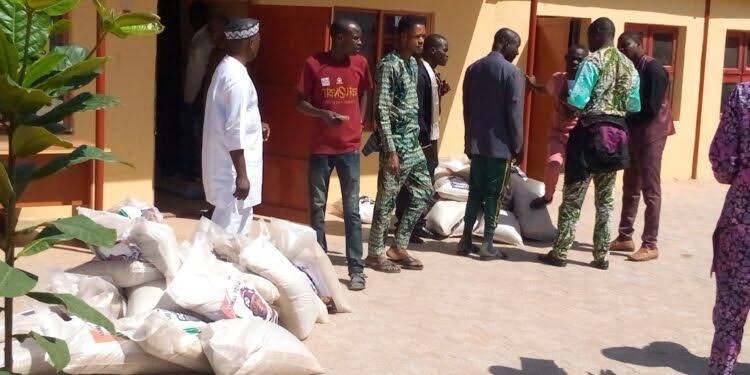The Jigawa State chapter of the Christian Association of Nigeria (CAN) has been thrown into crisis over the recent allocation of 600 pieces of 25kg bags of rice by the President Bola Ahmed Tinubu-led federal government.
Reports from the state indicated that President Tinibu had, through the Jigawa state Governor, Malam Umar Namadi, gifted the chapter 600 pieces of 25kg bags of rice as palliative which had been handed over to the state’s executive of the CAN under Chairmanship of Rev Father Morris Kole Hassan by the Jigawa state Commissioner of Special Duties, Alhaji Auwal D Sankara.
After receiving the palliative, the CAN chairman, Rev Father Morris Kole Hassan led the association executive to government house and acknowledged the receipt of the palliative, thanking the President and the governor for the gesture.
Speaking during the government house visit, Rev Father Morris Kole Hassan expressed gratitude to the federal and state Chief executives for timely consideration for Christians in the state, describing it as wonderful and good leadership, while promising judicial distribution among the members.
Tribune Online gathered in the state that few days after distribution of the palliative, a group of some christians under the leadership of the Pastor of Evangelical Church of Christ In Nigeria (ECCN) in Hadejia, Pastor Ibrahim Yahaya, accused the CAN executives of injustice and selective distribution of the palliative.
Speaking to our correspondent, Pastor Ibrahim Yahaya said “the palliative given for the Christmas was received and shared between few, it didn’t go round as is supposed to”.
Pastor Ibrahim Yahaya, who is also the chairman Non-indegens residing in Jigawa state, noted that “I can confirm to you that the goods were given to some members of the CAN leaders in some local government areas, themselves and a few selected people in the association. Anything for CAN belongs to all Christians. For example, I’m a christian and Pastor, I didn’t know of the disbursement, I only read it in the newspaper.
“There were prominent christians people and leaders of various communities who were residing in Dutse, the state capital. They were not involved and didn’t know how and when the rice was shared. We are so surprised that some things belonging to CAN were shared and those prominent didn’t know about it. Because everything for CAN belongs to all christians, why have some been sidelined?”.
He emphasized that the Jigawa state CAN chapter is not just to some of the members, adding that “because CAN is made of five blocks, and were told that each block was given 47 bags. If you add 47 bags by five it is not up to the total number of bags received..where is the remaining?”.
“We lodged a complaint to an appropriate authority. We paid a courtesy visit to his Excellency Governor Malam Umar Namadi. We told him of the problems. He (governor) told us that he is traveling and promised that when he comes back, all parties would be invited and open everything before everyone and resolve it”, ECCN Pastor said.
When contacted, the Jigawa state chairman of CAN, Rev Father Morris Kole Hassan denied all the allegations, describing it as baseless.
In a telephone conversation with our correspondent, the CAN chairman said the allegation is not true, “he is a liar and would fail. If he is a pastor in Hadejia, is he around when we distribute?, he is not around”.
The CAN chairman maintained that “when we distributed, we followed the sharing formula, CAN is made of five blocks, each block is made up of a group of churches. And each block collected equal share. Which block did he belong to? He should go to his own block and collect his rice”.
“Let me tell you the formula we used. CAN has been constituted of five blocks and each block collected 45 bags. So any block is to distribute to churches under it. Then, local government areas with a large number of Christians are also given 25 bags each. They (local government areas) are 15. So if you add it all, how many would it give you?”.
“To go to the media and lie, honestly, this is the formation of character that we cannot take it. Of course, we collected it and called all stakeholders including journalists; about three of them and distributed it. You journalist, go and verify from them, they are your colleagues,” he added.
